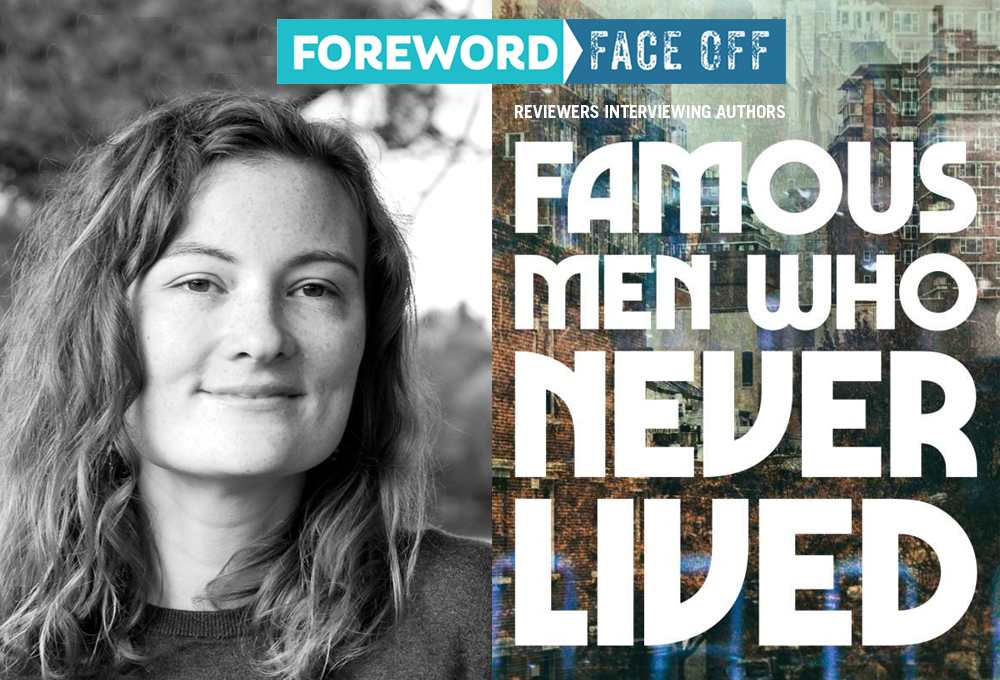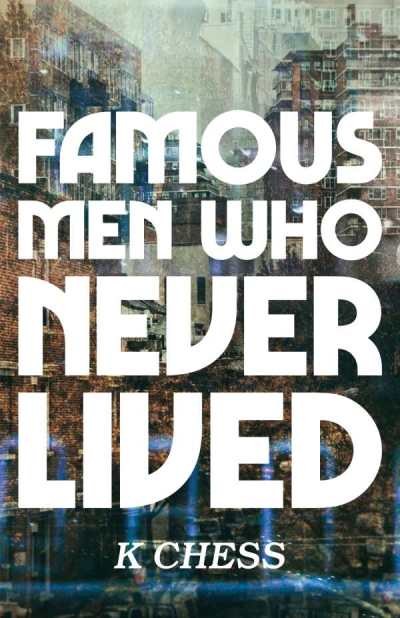Interview with K Chess, Author of FAMOUS MEN WHO NEVER LIVED

What we call science fiction is a conundrum—considering the fact that cell phones, the internet, 3D printing, and so much else in our world would have qualified as the stuff of science fiction only fifty years ago.
So, what is sci-fi?
Yes, of course, it’s entertainment, but is it also possible that sci-fi writers actually create new realities, or foreshadow new realities, when they let their minds wander beyond the accepted laws of nature? Think of the outrageous leaps of insight made by Galileo, Newton, and Einstein. When they first proposed their ideas, you can bet they were accused of being the creators of science fiction, but what made those geniuses different is that their best work happened in the laboratory of their own minds. In a sense, they created new knowledge just by thinking.
Lots to ponder, but perhaps the one takeaway available to us all is the notion that our thoughts and ideas are much more powerful than many of us believe.

This week’s interview is with K Chess, the debut author of Famous Men Who Never Lived, a work of sci-fi described by our Managing Editor Michelle Anne Schingler as an “awesome and humbling literary achievement” in her starred review for our March/April issue of Foreword Reviews. With the help of Tin House Books, we got the two young and gifted writers together for a fascinating conversation about speculative fiction, multiverses, and whether K would step through the looking glass. Enjoy!
What got you interested in multiverse theories, or in setting your book between two universes?
In order to conduct an experiment correctly, a scientist changes one thing while holding the other variables constant. Science fiction often works the same way; the writer creates a speculative world that differs from the real one in a single significant aspect, and explores that difference. The multiverse setting of Famous Men Who Never Lived makes that literal and explicit. The characters are in on it, too. They’re questioning the mechanism of the change and exploring its effects.
Excerpts of novels-within-novels often go very wrong, but your snippets of The Pyronauts were as gripping as the novel surrounding them. How did you accomplish the complicated task of stepping into a fictional writer’s shoes and pulling off “their” work so well? (Subquestion: have you, or would you, consider turning The Pyronauts into its own project?)
Thank you for saying so! Sections from The Pyronauts were not supposed to be part of this project. But one day, I started writing in the voice of Ezra Sleight, the fictional author. I think I was probably drawing on memories of the ‘50s paperbacks that used to be at my grandmother’s house. The book-within-a-book sections underscore some of the thematic concerns of the frame novel, and they were fun for me to work on. Someday I might write a novel about John Gund and Asyl, but I don’t know how it ends for them yet.
Faced with the decision to step through a portal into an unknown world yourself, and knowing that it’s a one-way trip, would you go? What would you take with you? What, or who, might you refuse to leave without?
Yes, I would go, and I’d leave everyone behind—that’s how it works, no exceptions—but I’m sure I’d feel bad about it later!
It’s hard to ignore the gender dynamics at play in the choices that your main characters make—Helen’s choices, in particular. A man making the same choices that she makes—leaving their child behind in order to live, reacting to their loss of status in a parallel universe with less than perfect grace—would be likely to receive much more sympathy than Helen is bound to encounter. Is that something that you want your audience to think about and tease out? How should we react to Helen’s “imperfections”?
Famous Men Who Never Lived is a book about the highly individual ways we deal with loss. Some people discover hidden reserves of strength and grace when they’re challenged. Hel is just not like that; her devastation makes her extremely unpleasant to be around. Part of what’s going on with her is that she no longer feels accountable for her actions in the manner women usually do. Hel’s family and friends and professional contacts are all dead; since she doesn’t belong to anyone anymore, it doesn’t matter to her what people think. Maybe readers will react to her bad behavior differently—with less compassion—then they would if it came from a male protagonist. If this is the reaction, I don’t know whether readers will be aware of it. In my mind, though, more UDPs are men than women. Women would more often feel that they had to say no to the chance. I wish I’d put that in the book.
Miscommunication is a recurrent theme in Famous Men Who Never Lived, particularly between UDPs and those native to the parallel universe they find themselves in. For most, it’s a point of continual frustration, but some—I’m thinking of the woman who insists that, where she’s from, people slap the dead to be sure that they’re really dead—decide to be subversive within the communication gaps. Who among your characters do you think bridges the communication gap best and why?
I think Wes does. He has a natural curiosity and openness. Also, his mark makes him distinguishable as a UDP, so he doesn’t always have the option of hiding, which pushes him to seek common ground with all kinds of people.
I read a crazy rumor that Famous Men Who Never Lived began as a NaNoWriMo project. Is said rumor true—did you not only write the perfect first novel, but actually write it (or draft it) in a month? Either way!: what is your secret?
No, this is not true! I started drafting Famous Men Who Never Lived in June and finished something that was about the right length in January or so. Less than a year seems incredibly fast; I can’t even fathom writing a novel in a month. The big challenge for me was to keep moving forward. Once I developed a general idea of the story and the arc in my head, I wrote down scenes on notecards. This meant I was working from an outline, but one that was easy to modify. I also found it helpful to keep each chapter in a separate file, so I wouldn’t be looking at the beginning over and over.
If you had to guess: what is K Chess up to in some parallel universes?
Because I’m a writer, I can imagine a lot of alternate lives that sound appealing! I like to work early in the morning, before most people are up—maybe alternate-K would be a graffiti artist or a baker.
Michelle Anne Schingler
